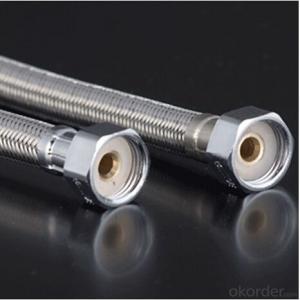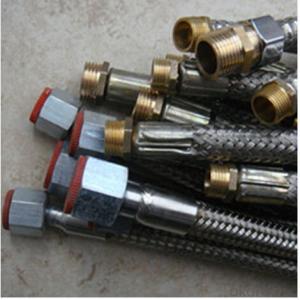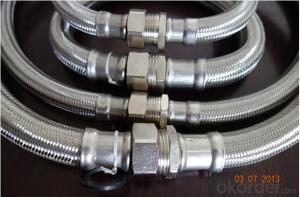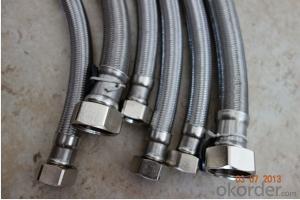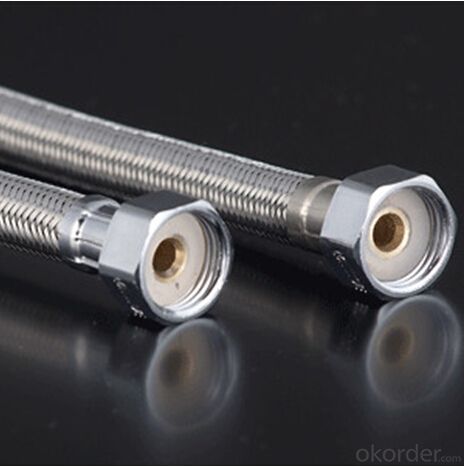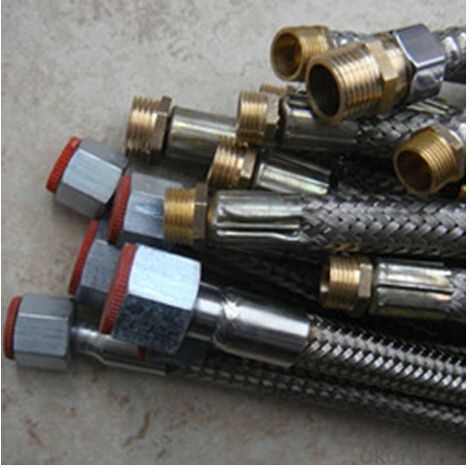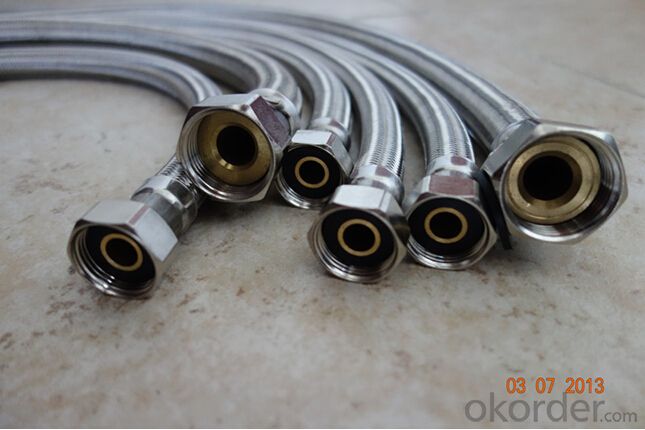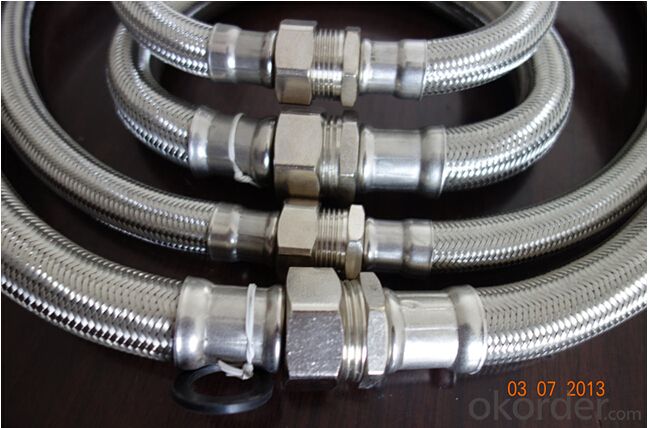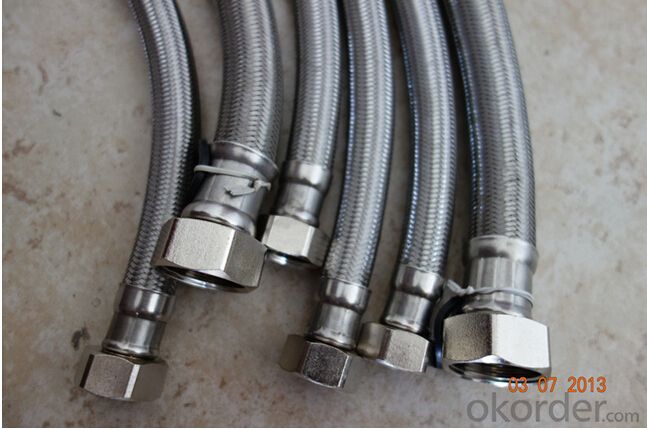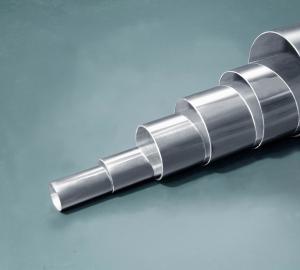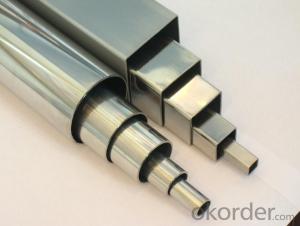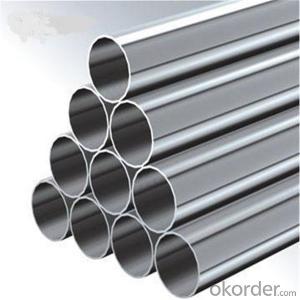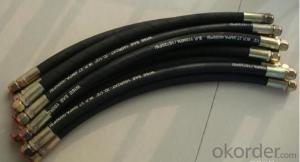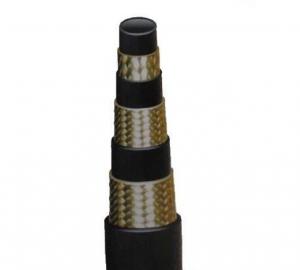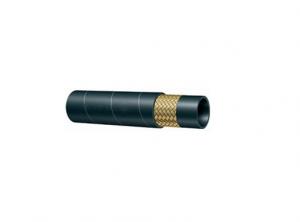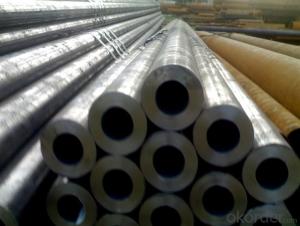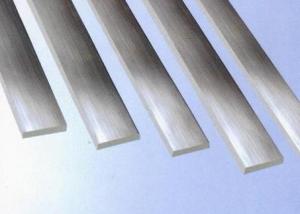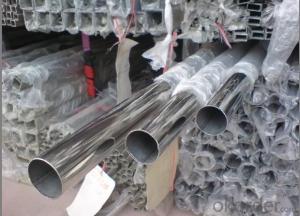Stainless Steel Braid Hose with High Pressure Corrugated
- Loading Port:
- Tianjin
- Payment Terms:
- TT OR LC
- Min Order Qty:
- 1000 pc
- Supply Capability:
- 100000 pc/month
OKorder Service Pledge
OKorder Financial Service
You Might Also Like
Specification
Stainless Steel Braid Hose with High Pressure Corrugated
Applications of Stainless Steel Braid Hose with High Pressure Corrugated:
--Refueling system
--Chemical and pharmaceutical industry
--Industrial hydraulic systems
--Air conditioners in industrial and construction –site vehicles
--Food and beverage industry
--Special and standard industrial applications
--Water and cleaning management
Features of Stainless Steel Braid Hose with High Pressure Corrugated:
1. )O. D.: 13-18MM 0.2-3M long
2. )Nut.: Nickel/Chrome Plated Brass (Zinc / Iron / Aluminum is available)
3. )Size Of Nut.: Female&Male 1/2''; 3/4''; 3/8''; 7/8''; 5/16'', and M10...
4. )Insert.: Brass (Zinc / Aluminum / Plastic is available)
5. )Inner tube.: Rubber/ EPDM/PVC
6. )Covered Material: Stainless Steel 201, 301, 304 /Aluminium Wire
7. )Working Pressure: 5Kg-15Kg
8. )Temperature: 0-92° C
9. )Quality Assurance: 3 years
RemarkAPPLICATION: HOUSEEHOLD WARE, BATHROOM WARE, SHOWER HOSE
PAYMENT: T/T, L/C
DELIVERY TIME: 20DAYS OR 30DAYS AFTER RECEIVED 30% DEPOSITS
MOQ: 5000PCS
ODM&OEM IS ACCEPTABLE
PackageInner: PP bag /Blister packing Outer: Carton box
Specifications of Stainless Steel Braid Hose with High Pressure Corrugated:
NO | I.D | Refer to O.D | Working pressure | Burst pressure | approximate Weight | |||||
(inch) | (mm) | (inch) | (mm) | MPa | Psi | MPa | Psi | kg/m | lbs/ft | |
1 | 1/8 | 3.2±0.2 | 0.35 | 9±0.3 | 2.06 | 300 | 8.27 | 1200 | 0.078 | 0.12 |
2 | 5/32 | 4±0.2 | 0.4 | 10±0.3 | 2.06 | 300 | 8.27 | 1200 | 0.092 | 0.14 |
3 | 3/16 | 4.8±0.2 | 0.43 | 11±0.3 | 2.06 | 300 | 8.27 | 1200 | 0.108 | 0.16 |
4 | 1/4 | 6.3±0.3 | 0.5 | 12.7±0.3 | 2.06 | 300 | 8.27 | 1200 | 0.134 | 0.2 |
5 | 5/16 | 8.0±0.3 | 0.56 | 14±0.3 | 2.06 | 300 | 8.27 | 1200 | 0.147 | 0.22 |
6 | 3/8 | 9.5±0.3 | 0.63 | 16±0.4 | 2.06 | 300 | 8.27 | 1200 | 0.182 | 0.27 |
7 | 15/32 | 12±0.3 | 0.75 | 19±0.5 | 2.06 | 300 | 8.27 | 1200 | 0.238 | 0.35 |
8 | 1/2 | 12.7±0.4 | 0.78 | 20±0.5 | 2.06 | 300 | 8.27 | 1200 | 0.262 | 0.39 |
9 | 5/8 | 16±0.4 | 0.94 | 24±0.5 | 1.03 | 150 | 4.12 | 600 | 0.351 | 0.52 |
10 | 3/4 | 19±0.4 | 1.13 | 28.8±0.5 | 1.03 | 150 | 4.12 | 600 | 0.515 | 0.77 |
11 | 1 | 25.4±0.5 | 1.38 | 35±0.6 | 1.03 | 150 | 4.12 | 600 | 0.637 | 0.95 |
Images of Stainless Steel Braid Hose with High Pressure Corrugated:
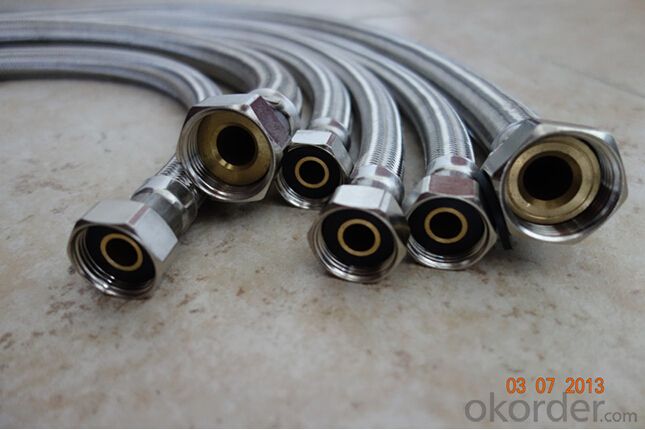
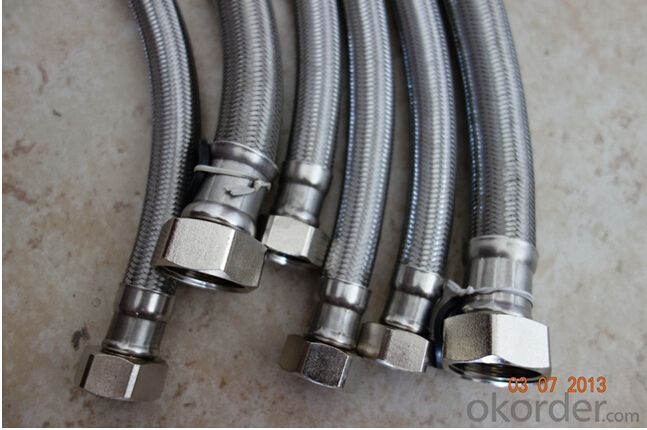
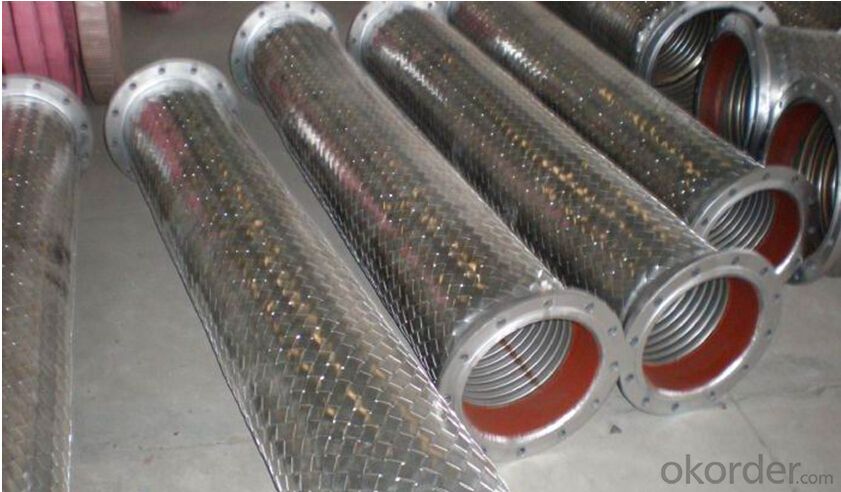
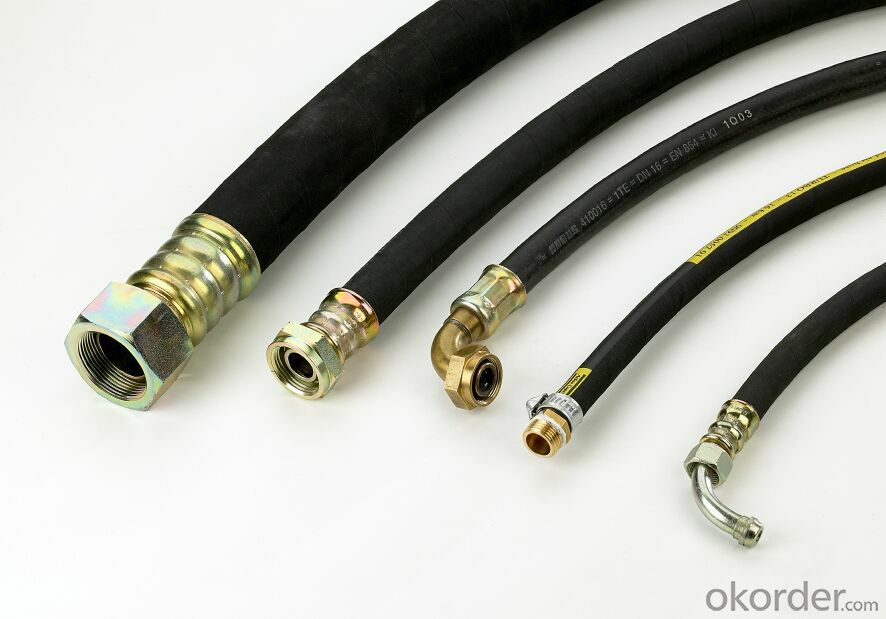
Package of Stainless Steel Braid Hose with High Pressure Corrugated:
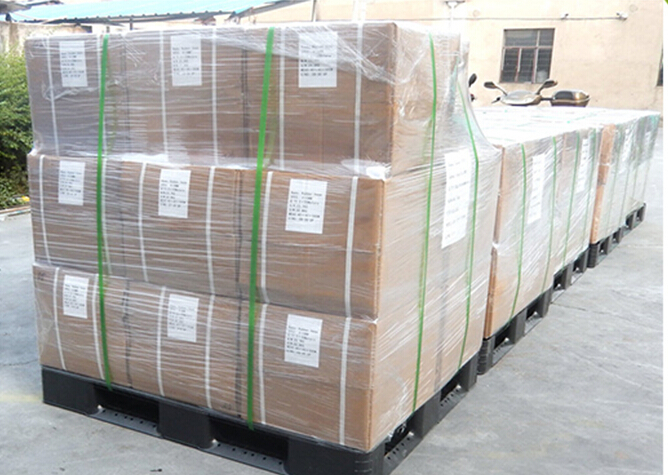
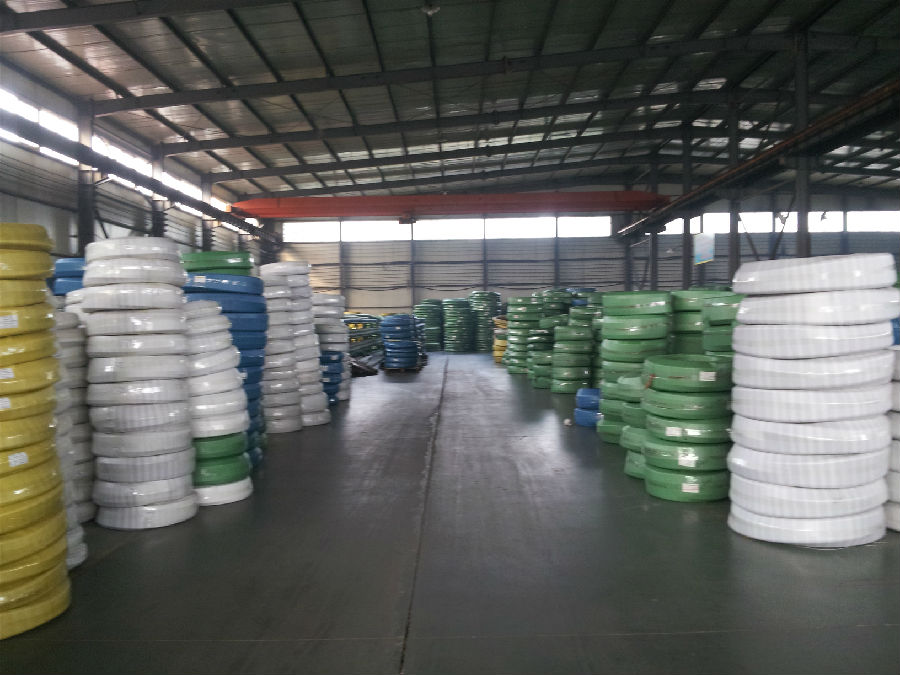
FAQ of Stainless Steel Braid Hose with High Pressure Corrugated:
Who we are:
Answer: We CNBM is a Chinese state-owned enterprise ranked 267th among the Global Fortune 500, as the largest building materials company,we have over 300 affiliated companies,and so many production lines and branch office distribute in China.
2. About our quality:
Answer: Every product needs to be quality proved before shipping.
3. About our service:
Answer: We could gurantte that we can reply you in 2 working hours.
- Q: How do stainless steel pipes compare to polypropylene pipes?
- Stainless steel pipes generally have superior strength, durability, and resistance to corrosion compared to polypropylene pipes. They are suitable for high-pressure and high-temperature applications, making them ideal for industries such as oil and gas. On the other hand, polypropylene pipes are lightweight, flexible, and cost-effective, making them a popular choice for water supply and drainage systems. The choice between stainless steel and polypropylene pipes depends on the specific requirements of the application, budget, and other factors such as chemical compatibility and installation ease.
- Q: Can stainless steel pipes be insulated with polystyrene?
- Yes, stainless steel pipes can be insulated with polystyrene. Polystyrene is a commonly used insulation material due to its thermal properties and ability to resist moisture. It can effectively reduce heat transfer and prevent condensation on the surface of the pipe. However, it is important to ensure that the polystyrene insulation is properly sealed and protected to avoid any degradation or damage to the stainless steel pipe.
- Q: What are the common sizes and dimensions of stainless steel pipes?
- Stainless steel pipes come in a variety of sizes and dimensions to suit different applications and requirements. The common sizes and dimensions of stainless steel pipes are typically classified based on their nominal pipe size (NPS), which refers to the inner diameter of the pipe. The most common sizes of stainless steel pipes range from 1/8 inch to 36 inches in diameter. These sizes are readily available and widely used in various industries such as construction, oil and gas, chemical processing, and plumbing. However, stainless steel pipes can also be custom made to meet specific needs. In terms of dimensions, stainless steel pipes are typically available in standard schedules, which specify the wall thickness of the pipe. The most common schedules include Schedule 5, Schedule 10, Schedule 40, and Schedule 80. Each schedule has a different wall thickness, allowing for different levels of pressure and strength. Additionally, stainless steel pipes can be found in various lengths, ranging from 20 feet to custom lengths depending on the manufacturer and the application. The standard length for stainless steel pipes is often 6 meters or 20 feet, but shorter or longer lengths can be requested or cut to meet specific project requirements. It is important to note that while these sizes and dimensions are common, there are various other factors to consider when selecting stainless steel pipes, such as the material grade, corrosion resistance, temperature and pressure ratings, and specific industry standards. It is always advisable to consult with a professional or refer to the appropriate standards and specifications to ensure the correct selection of stainless steel pipes for a particular application.
- Q: Are stainless steel pipes suitable for underground drainage systems?
- Yes, stainless steel pipes are suitable for underground drainage systems. Stainless steel is highly resistant to corrosion, making it an ideal material for applications where the pipes will be exposed to moisture and other corrosive elements. Additionally, stainless steel pipes have a long lifespan and require minimal maintenance, making them a cost-effective choice for underground drainage systems. They are also able to withstand high pressure and temperature variations, ensuring the durability and reliability of the drainage system. Overall, stainless steel pipes provide excellent performance and are a reliable choice for underground drainage systems.
- Q: What is the difference between Schedule and Nominal Pipe Sizes for stainless steel pipes?
- Schedule and Nominal Pipe Sizes are both used to describe stainless steel pipes, but they refer to different aspects of the pipe. Schedule refers to the wall thickness of the pipe and is denoted by a number. It is a standardized system used to categorize pipes based on their wall thickness. The schedule number indicates the thickness of the pipe in relation to its diameter. For example, a Schedule 40 pipe has a thicker wall than a Schedule 10 pipe of the same diameter. The higher the schedule number, the thicker the wall. On the other hand, Nominal Pipe Size (NPS) refers to the approximate inner diameter of the pipe and is expressed in inches. NPS is a non-dimensional size designation that does not correspond directly to the actual dimensions of the pipe. It is used as a convenient reference for pipe identification and is often used in conjunction with the schedule number to specify a particular pipe. In summary, the main difference between Schedule and Nominal Pipe Sizes for stainless steel pipes lies in what they describe. Schedule indicates the wall thickness, while Nominal Pipe Size refers to the approximate inner diameter of the pipe. Both are important factors to consider when selecting the appropriate stainless steel pipe for a specific application.
- Q: What is the average weight of a stainless steel pipe?
- The weight of a stainless steel pipe can differ based on its size, wall thickness, and length. Various dimensions and grades are accessible for stainless steel pipes, which can impact their weight. However, in general, stainless steel pipes are typically heavier compared to pipes made from alternative materials due to the density of stainless steel. The weight of a stainless steel pipe can range from a few kilograms to several hundred kilograms per meter, depending on the factors mentioned earlier. To accurately determine the exact weight of a stainless steel pipe for a specific application, it is crucial to refer to the product specifications or consult a supplier.
- Q: Are stainless steel pipes suitable for chemical storage tanks?
- Yes, stainless steel pipes are typically suitable for chemical storage tanks. Stainless steel is highly resistant to corrosion and can withstand the harsh chemicals stored in tanks, making it a preferred material for chemical storage applications.
- Q: What is the difference between 304 and 304H stainless steel pipes?
- The carbon content is the main factor distinguishing 304 and 304H stainless steel pipes. Both materials consist of iron, chromium, and nickel, but 304H stainless steel has a higher carbon content compared to 304 stainless steel. This increased carbon content in 304H enhances its strength and resistance to deformation at high temperatures, making it more suitable for applications involving elevated temperatures. The higher carbon content in 304H stainless steel pipes also improves their ability to resist sensitization during welding. Sensitization refers to the formation of chromium carbides at the grain boundaries, which can lead to intergranular corrosion and reduced mechanical properties. By incorporating a higher carbon content, 304H stainless steel pipes can effectively resist this sensitization phenomenon and maintain their structural integrity even at high temperatures. Both 304 and 304H stainless steel pipes exhibit excellent corrosion resistance, good weldability, and high strength. They find extensive use in various industries, including oil and gas, chemical, food processing, and pharmaceuticals. However, it is worth noting that 304H stainless steel pipes are typically recommended for applications requiring high-temperature strength, while 304 stainless steel pipes are more commonly used for general-purpose applications. In conclusion, the carbon content distinguishes 304 and 304H stainless steel pipes. 304H stainless steel pipes have a higher carbon content, which enhances their high-temperature strength and resistance to sensitization during welding. These differences should be taken into account when selecting the appropriate stainless steel pipe for a specific application.
- Q: Water and electricity thin wall stainless steel tube 304 material delta 2 what does that mean?
- 304 stainless steel is a universal stainless steel material, antirust performance than the 200 series of stainless steel material stronger.
- Q: Can stainless steel pipes be used for gas distribution?
- Gas distribution can utilize stainless steel pipes since they are highly durable and resistant to corrosion. This material is suitable for various applications, including gas distribution systems, thanks to its excellent resistance against the damaging effects of gases and moisture. By using stainless steel pipes, the gas distribution network can maintain its integrity and ensure safety. Moreover, these pipes possess high tensile strength, enabling them to withstand the high pressure and temperature conditions often encountered in gas distribution. Furthermore, stainless steel is non-reactive and does not release harmful substances into the gas stream, which makes it a reliable option for transporting gases. In conclusion, stainless steel pipes are the preferred choice for gas distribution due to their durability, corrosion resistance, and adherence to high safety standards.
Send your message to us
Stainless Steel Braid Hose with High Pressure Corrugated
- Loading Port:
- Tianjin
- Payment Terms:
- TT OR LC
- Min Order Qty:
- 1000 pc
- Supply Capability:
- 100000 pc/month
OKorder Service Pledge
OKorder Financial Service
Similar products
Hot products
Hot Searches
Related keywords
